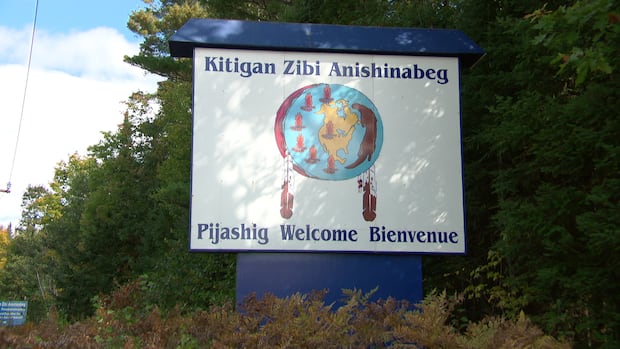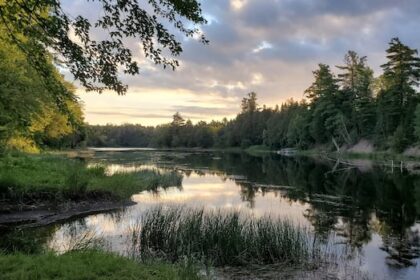Ottawa·NewThe title claim filed by the western Quebec First Nation encompasses eight main areas, including Gatineau Park, the Baskatong Reservoir, and the Papineau-Labelle wildlife reserve. It also includes a $5-billion lawsuit against several parties, including the Quebec and federal governments.Claim against the Quebec and Canadian governments also includes a $5-billion lawsuitLiam Baker · CBC News · Posted: Nov 01, 2025 5:46 PM EDT | Last Updated: 38 minutes agoListen to this articleEstimated 4 minutesJean-Guy Whiteduck is the chief of Kitigan Zibi Anishinābeg. The western Quebec First Nation recently filed a land claim against the province and the federal government. (CBC)Kitigan Zibi Anishinābeg has filed a land title claim against the Quebec and Canadian governments, one that encompasses large swaths of land in western Quebec. Part of the claim is intended to protect the interests of future generations of members of the western Quebec First Nation, said Chief Jean-Guy Whiteduck.“We want to protect the resources, make sure they’re managed in a sustainable way that everyone benefits, today and into the future,” Whiteduck told CBCThe title claim was filed in Quebec Superior Court on Oct. 24. It includes a $5-billion lawsuit over alleged violations of constitutionally protected rights by the Canadian and Quebec governments and Hydro-Québec, according to a press release from the First Nation. “It’s a reasonable number, based on other similar types of cases and just given the area of the land at issue and the nature of the breaches of rights that have occurred,” said Julian Riddell, a lawyer representing Kitigan Zibi in the case. The National Capital Commission (NCC) has also been named as a defendant in the case. Includes reservoir, Ottawa River islandsThe title claim encompasses eight main areas, including Gatineau Park, the Baskatong Reservoir, and the Papineau-Labelle wildlife reserve. It also covers several islands in the Ottawa River, including Morris and Kettle Islands. Whiteduck says Kitigan Zibi never relinquished these lands.Pink Lake in Gatineau Park is seen in October 2021. Kitigan Zibi’s title claim encompasses eight main areas, including the sprawling western Quebec park. (Frédéric Pepin/Radio-Canada)The claim isn’t meant to affect private citizens who own property in the land in question, Whiteduck said.“Eventually, if the whole Algonquin territory is involved, there will be many private owners on it. I think it’s something that can be resolved at the negotiation table that’s fair to the fee simple owners,” Whiteduck said. “It’s not to take anything away from them.”Could set precedent, says lawyerThe title claim is largely centred on the 1760 Treaty of Swegatchy between the British government and the Algonquin Anishinaabe Nation and the Royal Proclamation of 1763. The Treat of Swegatchy promised the protection of the Algonquin Anishinaabe Nation’s lands and way of life, according to documents included in the court filing.As part of the case, Kitigan Zibi claims the transfer of control over Gatineau Park to the NCC by the Canadian government was in direct contravention of both the treaty and the Royal Proclamation. Moreover, court filings also claim the Quebec government violated these accords in authorizing the construction of the Mercier hydroelectric dam, as well as the creation of the Baskatong Reservoir in 1927. Julian Riddell is a lawyer representing Kitigan Zibi Anishinābeg in its land title case over large portions of western Quebec. (Submitted by Julian Riddell)The reservoir led to the flooding of lands previously under the control of the Algonquin Anishinaabe Nation, an ancestor of Kitigan Zibi.Riddell says the title claim has the potential to set a precedent in Quebec as the first successful Indigenous title case in the province.“The case also has a historic treaty aspect to it,” Riddell said. “[It] is relying on those agreements and promises, which has been done to some extent in other cases, but these particular issues have never been addressed.”Comes after B.C. victoryIn the past, the Quebec government has refused to negotiate with Kitigan Zibi over claims to their ancestral territories, Whiteduck said.The recent land claim victory by the Quw’utsun Nation in August — in which the British Columbia Supreme Court ruled the First Nation ad a right to over 300 hectares of land in Richmond, B.C. — inspired the filing of Kitigan Zibi’s own land claim case, he added.Kitigan Zibi previously filed a separate land claim case in 2016 in Ontario over lands encompassing Parliament Hill and Lebreton Flats, alongside a trio of islands in the Ottawa River. The Quebec and Canadian governments, as well as the NCC, did not provide comment to the CBC regarding the case prior to publication. In an email, a spokesperson for Hydro-Québec said the corporation is not in a position to comment as the case is not yet before the court. Whiteduck said he hopes the land claim case will result in an agreement between Kitigan Zibi and the Canadian and Quebec governments over how to share resources and how to develop the First Nation’s ancestral lands. “We’re looking [out] for the welfare of our people and to have our regular place on our homeland,” he said. “That’s the main message.”ABOUT THE AUTHORLiam Baker is an associate producer and reporter for CBC Ottawa. He also reports and produces stories on Inuit Nunangat for CBC Iqaluit. Previously, he’s reported for CBC Yukon, CBC Thunder Bay, CBC Toronto’s Enterprise unit. You can reach him at liam.baker@cbc.caWith files from The Canadian Press
Wednesday, 4 Feb 2026
Canada – The Illusion
Search
Have an existing account?
Sign In
© 2022 Foxiz News Network. Ruby Design Company. All Rights Reserved.
You May also Like
- More News:
- history
- Standing Bear Network
- John Gonzalez
- ᐊᔭᐦᑊ ayahp — It happened
- Creation
- Beneath the Water
- Olympic gold medal
- Jim Thorpe
- type O blood
- the bringer of life
- Raven
- Wás’agi
- NoiseCat
- 'Sugarcane'
- The rivers still sing
- ᑲᓂᐸᐏᐟ ᒪᐢᑿ
- ᐅᑳᐤ okâw — We remember
- ᐊᓂᓈᐯᐃᐧᐣ aninâpêwin — Truth
- This is what it means to be human.
- Nokoma











